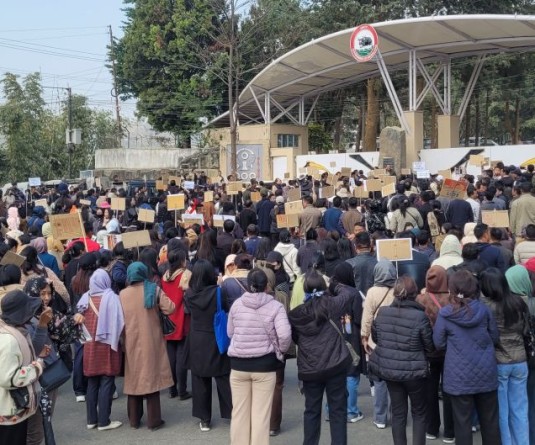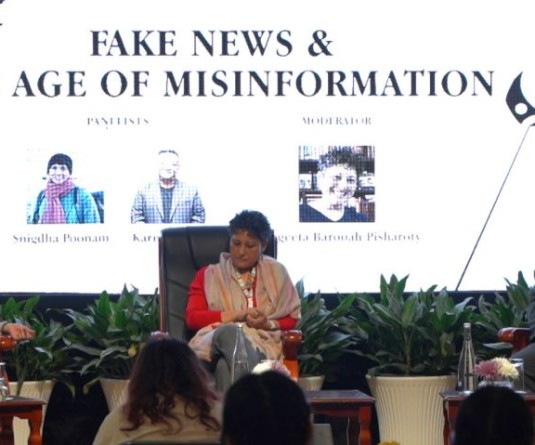A man holds his fist up in the air during a candle light vigil in solidarity with the Oting victims in Kohima. (Photo courtesy Zhazho Miachieo)
.jpg)
Dimapur, January 3 (MExN): The Government of India’s decision to declare the entire state of Nagaland a “disturbed area” and extend the Armed Forces (Special Powers) Act (AFSPA) for six more months with effect from December 30, 2021 has drawn flak from various quarters.
NDPP: Nagaland’s ruling Nationalist Democratic Progressive Party (NDPP) demanded that the Union Home Ministry’s notification extending the AFSPA in the entire state till June 30, 2022, should be ‘nullified and revoked,’ and said that “the use of the words ‘dangerous and disturbed’ is definitely misleading and inappropriate.”
The NDPP stated that at present, “Nagaland has been amongst the safest states for more than two decades and there has been no serious encounter with the security forces,” and that the ceasefire which has been in place for the last 25 years “is working and there is relative peace and tranquility.” Maintaining that the overall law and order situation in Nagaland has been very peaceful and the state has also been acknowledged as the most peaceful state at many forums, the party pointed out that “The only major incident that shockingly disturbed the peace was the Oting incident of December 4, 2021, which had nothing to do with insurgency or law and order.”
Issuing notifications and orders with ‘such language’ is unwarranted and will negatively impact the ambition and aspirations of the young generation and the youth, especially when the people are anxiously waiting for a final settlement of the Indo-Naga issue, the NDPP statement read.
The NDPP went on to state that Nagaland has been undergoing positive growth in tourism and service sectors and it has emerged as a popular destination. “But with an unnecessary extension of disturbed areas and the imposition of AFSPA, our efforts towards economic growth and integration with the mainstream will only be negatively impacted,” it maintained.
“There is a mass movement against AFSPA, with the Nagaland Assembly loudly advocating the feelings of the people through a resolution on December 20, which has been submitted to the government of India through the Union Home Minister (Amit Shah),” it said.
“The MHA notification only belittles the high-level meeting held between the Home Minister, Chief Ministers of Nagaland and Assam, Deputy Chief Minister of Nagaland, the leader of the Naga People’s Front (NPF) legislative party and former Chief Minister of Nagaland on December 23 in Delhi,” it added.
The notification comes at a time when the people of Nagaland are confidently under the impression that with the setting up of the high-powered committee by the MHA to seriously examine and consider the repeal of AFSPA and removal of the disturbed area coverage, no order or notification would be issued till the report of the committee is final, the statement said.
Terming the notification as “a rude shock and a huge disappointment to the people of the state,” the NDPP that the government of India must make efforts towards building confidence and strengthening that trust at a time when the Naga people have put their trust and confidence on the assurance that the peace talks are moving in a positive direction.
“It must make every possible effort to increase the role of the youth and the younger generation in the nation-building process. By passing such an unpopular and unwanted order, the feeling of alienation will only grow. It is high time the narrative is reversed,” the NDPP statement said.
NPCC: Stating that extension order of AFSPA was ‘malafide’ and “a slap to Nagaland State Assembly resolution, Oting Massacre and the people of Nagaland across the world,” NPCC President K Therie took said the reactions from various ruling partners were amusing. “It is just short of saying, whatever may be, they will continue to support the BJP led central Government,” he said in a press release.
Therie claimed that there was complete distrust of the alliance government in Nagaland as per Congress’ assessment and said that the decisions made during the meeting between the nion Home Minister, Nagaland Chief Minister, Deputy Chief Minister and the leader of NPFLP “turned out to be a bluff.”
“As we mourn with the aggrieved, we cannot appreciate, thank or clap. Union Home Minister had misled Parliament and the Nation in justifying the Oting massacre. Appreciating him at this junction is nothing but an insult,” the release stated.
Referring to Ministry of Home Affairs’ notification that stated: “The Central Government is of the opinion that the area comprising the whole of Nagaland is in such a disturbed and dangerous condition that the use of armed forces in aid of the civil power is necessary,” the NPCC president asserted that the justification of extension of AFSPA was in contrast to the ceasefire. The question of “dangerous condition” does not arise in Ceasefire, he added.
Therie acknowledged that “there may be public disturbances by Naga insurgent factions on account of extortion and factional violence,” however, he alleged that it was a creation of the ruling alliance.
The policy to ‘actively facilitate’ insurgents is responsible for internal disturbances, he claimed while questioning the GoI as to why it is imposing AFSPA if it recognises public disturbance. “Why not rather dismiss the State Government which actively facilitates internal disturbances?” he added.
Alleging that the Oting massacre was a game plan of the State Government to violate ceasefire, delay implementation of negotiated solution so that it would continue to rule, Therie stated, “I do not see justice will be delivered. We have not seen any concrete move of the Government in that direction. All its activities appear to endeavour to hide the criminals and conspirators. They are trying to escape under the garb of AFSPA which will be extended every six months.”
“Nagaland State Government has failed to protect, defend and stand for the people. They have also gone back from their own commitment to pave the way for solution,” he maintained.
NPP: The National People’s Party (NPP), Nagaland State Unit meanwhile issued a 5-point memorandum addressed to the Prime Minister of India, drawing attention to what it said were “legitimate requests on behalf of the people of Nagaland.”
In the memorandum, the NPP demanded apology from the Central government for killing innocent civilians because of a “botched-up army operation due to wrong intelligence inputs” at Oting-Tiru village and Mon town on December 4 and 5.
Stating that it was the bounden responsibility of the Government of India (GoI) to tender a sincere apology to the families of deceased and injured victims, the party asked the Centre to come out clean and accept the grave blunder on the part of intelligence agencies and Indian Army by issuing a public apology in both Lok Sabha and Rajya Sabha so that the faith of Naga people in the Central government was restored.
It also called for proper investigation by a national investigation agency or the CBI and punitive action against the erring jawans and requested the GoI to be unbiased and sincere in going into the truth and to conduct a free and fair investigation into the circumstances leading into the firing upon and killing of innocent civilians.
The NPP requested the GoI to be give adequate compensation to the families of the deceased as well as the injured through direct transfer of ex-gratia amounts and also by providing government jobs to at least one family member of the deceased. This may not be able to bring back their precious lives but this will ensure that their families get due compensation and a source of income as the ones who were killed were the sole bread-earners of their families and “not gun-wielding terrorists as the sources in the government and the military are trying to paint it,” the memorandum stated.
While expressing its belief that the present Government has been keen and serious in solving the vexed Naga Political Issue, it also regretted that the same government which has ruled out resolution of the issue through violence and enmity has also kept the priority of peaceful coexistence asunder by continuing with draconian laws like the AFPSA.”
Moreover, we feel that when you have already extended your hand for peace talks why should the Central Government have a disturbing agenda of derailing this peace process by imposing and continuing with such an arbitrary law like AFPSA,” it said.
The party said that the GoI, instead of coming up with concrete and conclusive proposals towards a solution to the decades long Indo-Naga political problem, has extended AFSPA without fully assessing the present condition and ground realities of present day Nagaland in particular and the North Eastern region in general. “At present when almost all the Naga Political Groups have come to the talks-table and there are no such provocative threats on the Indian Security Agencies as it was before the cease-fire, we feel that the Central Government should give meaningful leverage to the peace talks by bringing to an end the draconian Armed Forces Special Powers Act (AFSPA),” it maintained.
“On this particular aspect we are very resolute and determined because the AFSPA has done more harm to the people of the North East including Nagaland,” it added.
Making its point, the NPP asserted that AFSPA clearly violates the Right to Life and personal liberty granted under Article 21 of the Constitution of India, provides impunity to the military officers by establishing that no legal proceedings can be brought against any member of the armed forces acting under the AFSPA, without the permission of the Central Government. It also highlighted that the contentious law which leaves the victims of the armed forces’ abuses without a remedy has been challenged on several occasions by many human rights activists as it contravenes both Indian and International law standards. “AFPSA also violates the following provisions of the Universal Declaration of Human Rights (UDHR), such as; Free and Equal Dignity (Article 1), Non discrimination (Article 2), Life, Liberty, Security of person (Article 3), No torture (Article 5), Equality before the law(Article 7), Effective remedy (Article 8), No Arbitrary arrest (Article 9), Right to property(Article 17). The greatest outrage of the AFSPA under both Indian and International law is the violation of the right to life. This comes under Article 6 of the ICCPR, and it is a non-derogable right. This means no situation, or state of emergency, or internal disturbance, can justify the suspension of this right,’ it contended.
Stating that the people of Nagaland and the citizens of the North East should not be treated as adversaries of the Indian nation but as peace loving people who have equal rights under the same Constitution of India, it requested the GoI “not to merely appease the people by suggesting partial repeal of the AFSPA or making some alternate and biased arrangement which is nothing but temporary solution to the problem.”
Further, the NPP also appealed to the Prime Minister for early conclusion of the Indo-Naga peace talks and permanent settlement.
“During this peace process and talks for early solution, when the people are eagerly looking forward to peace and progress in the state and region, it would be a magnanimous act on the part of the Government of India in not continuing with such repressive laws like the AFPSA so that the mutual trust and understanding between the Indian Government and the Nagas is not hampered,” it said, asking the GoI to “take a leap forward by earning the trust of the Naga populace by bringing to an end the AFSPA first before anything else.”
The decisions now lie before the Central Government, to take up the necessary review at the parliamentary level to repeal the AFSPA as soon as possible so that the mighty efforts of our predecessors to usher in an era of peace and good will do not go in vain, it added.






